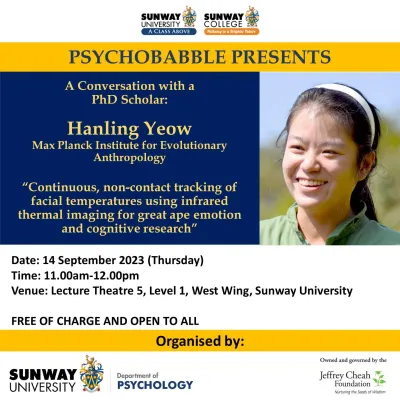Continuous, Non-Contact Tracking of Facial Temperatures Using Infrared Thermal Imaging for Great Ape Emotion and Cognitive Research
PhD scholar Hanling Yeow from the Max-Planck-Institute for Evolutionary Anthropology will be visiting the School of Medical and Life Sciences at Sunway University. She will give a talk on Thursday, September 14, 2023, hosted by the Department of Psychology.
She will be speaking on "Continuous, non-contact tracking of facial temperatures using infrared thermal imaging for great ape emotion and cognitive research." Her talk will be held from 11:00 AM to 12:00 PM at Lecture Theatre 5, Level 1, West Wing, Sunway University.
All are welcome to attend.
Abstract
There is a great interest in using non-contact technology to study emotion and cognition in subjects such as animals and infants, who are unable to communicate through language. Some emotional changes are linked to physiological arousal of the sympathetic nervous system, which causes the "fight or flight" response, with effects such as increased heart and breathing rates and pupil dilation. Blood vessels on the skin surface also constrict, leading to a temperature change which is measurable by infrared thermal cameras. Infrared thermal imaging is thus a valuable tool as it allows the measurement of physiological processes linked to emotional and cognitive changes without the need for attaching sensors to the subject's body.
Current methods to measure great ape skin temperatures are limited, as they require taking discrete measurements through wire mesh, which is not sensitive to subtle and quick changes and is affected by factors such as angle and breathing. Here, we developed a new apparatus to record facial temperatures of zoo-living chimpanzees through infrared-transmissive glass, without being occluded by a mesh barrier.
This allows us to continuously and automatically track facial regions of interest using machine learning tools. With this, subtler and faster changes in nasal temperatures can be detected, and heart rate and breathing rate can also be measured remotely. Possible uses include combining thermal imaging with eye-tracking paradigms to link behavioural preferences to physiological effects and enabling new experiments on great ape cognition, such as measuring cognitive effort.
About the Speaker
Hanling Yeow is a PhD researcher in the Department of Comparative Cultural Psychology at the Max Planck Institute for Evolutionary Anthropology in Leipzig, Germany. Her research interests lie in optimizing cognitive experiments for great apes, utilizing newly available technologies.
She completed a master's degree at Kyoto University, where she investigated how chimpanzees reacted to cues related to death-related stimuli at Kumamoto Sanctuary. She collaborated with Fumihiro Kano and Hirata Satoshi on various non-invasive experiments to study great ape cognition, including methods involving eye-tracking, thermal imaging, and touch panels.
Currently, Hanling is working with great apes at the Leipzig Zoo to develop a new thermal imaging method that allows for simultaneous physiological and eye-tracking measurements, enhancing the study of great ape cognition. She also has a keen interest in eye-tracking experiments that delve into what influences the perception of agency in great apes.






